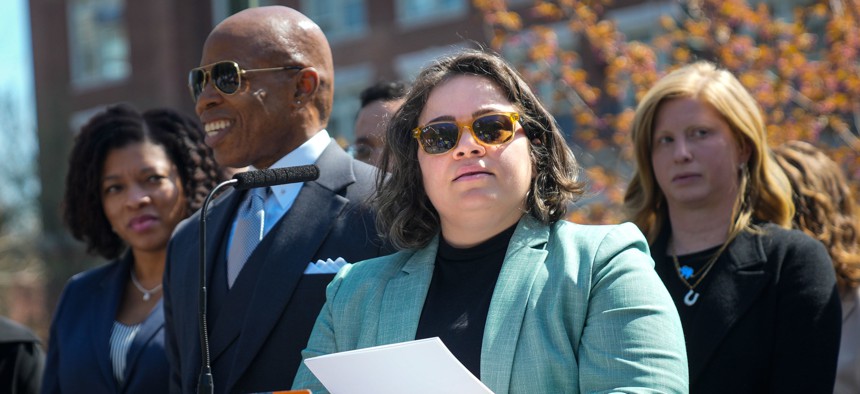‘We Needed a Maestro:’ After Months Long Search, New York City Has Found Its Rat Czar

Kathleen Corradi, who currently works for the Department of Education, will be the city’s rat czar. Michael Appleton/Mayoral Photography Office
Kathleen Corradi has been going after rodents since she was 10. Her work is about to get even bigger.
This article was first published by Route Fifty partner publication, City & State New York.
New York City rats beware. The time has come. She’s a land use expert primed for the hunt, well-versed in rat wrangling, and recently honed her mitigating efforts in schools—Kathleen Corradi, who currently works for the Department of Education, will be the city’s rat czar.
The announcement came from St. Nicholas Park in Harlem Wednesday morning where a triumphant New York City Mayor Eric Adams announced his long awaited selection for the individual tasked with beating back the city’s booming rat population. For months, many New Yorkers have waited with bated breath (or at least a myriad of wry amusement and curiosity) as city leaders sifted through thousands of applications, intent on finding their “director of rodent mitigation. While rats are easy to joke about, it’s serious work, according to Adams—their presence has a direct impact on how New Yorkers feel about the city, he said.
“We can’t be philosophical about things that impact the quality of life of New Yorkers so we took this serious,” Adams said.
Corradi, who will earn a salary of $155,000, is no stranger to fighting rats. Her introduction to public service came when she was 10 years old as she embarked on the noble task of collecting signatures for anti-rat measurers in her neighborhood. More recently, Corradi spearheaded the New York City education department’s rat reduction efforts where she helped guide nearly 70% of schools with “persistent rat issues” to their compliance goals. What she learned from those three years will directly translate to how she tackles the city’s rat population—something she described as a robust “science and systems-based approach” that will focus on cutting off the food, water and shelter necessary to rat survival.
“Rat mitigation is more than a quality of life issue. Rats are the symptom of systemic issues, including sanitation, health, housing, and economic justice,” Corradi said. “You can’t just deal with one part of the problem and call it a day. We need system-wide solutions, strong leadership, and an engaged population to join the efforts.” She also cited her background in biology, urban sustainability, and time as a former elementary school teacher as assets in this work.
The original job listing, which first hit the web in late November, painted a bold picture of the desired candidate. Attributes like a “swashbuckling attitude, crafty humor, and general aura of badassery” and “somewhat bloodthirsty” were a must, according to the posting. While New York City already has someone within the city health department serving as its director of pest control services—seasoned rat expert Rick Simeone—Adams said that Corradi will coordinate and work together with the sanitation and health department, community organizations and the public to curb the city’s rat population. It’s a new position, tasked with fighting an old war. The city has unfurled a series of recent initiatives including announcing new trash pickup times and issuing fines for New Yorkers who leave their trash outside too long.
“It’s many rivers that feed the sea of rats ... There is no instant rat pellet that’s going to solve this problem. You have to build dams in every area,” Adams said, adding, “We needed someone that was going to put all the pieces together and all the players together to coordinate this entire symphony of fighters. We needed a maestro.”
The city recently announced four “rat mitigation zones” that will receive additional help in eliminating its rat population. On Wednesday, Adams announced a $3.5 million investment to expand the city’s efforts in Harlem.
“You’ll be seeing a lot of me and a lot less rats,” Corradi promised. “There’s a new sheriff in town and with your help we will send those rats packing.”
NEXT STORY: Do Zoning Reforms Benefit Renters?





